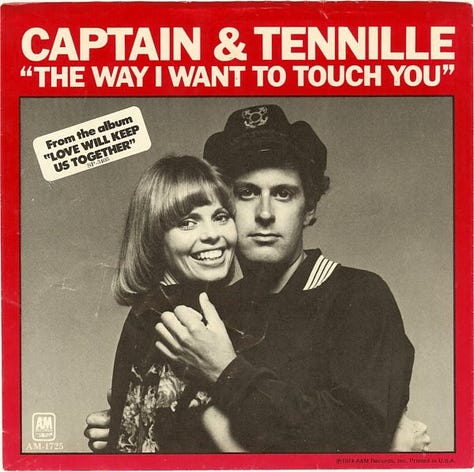
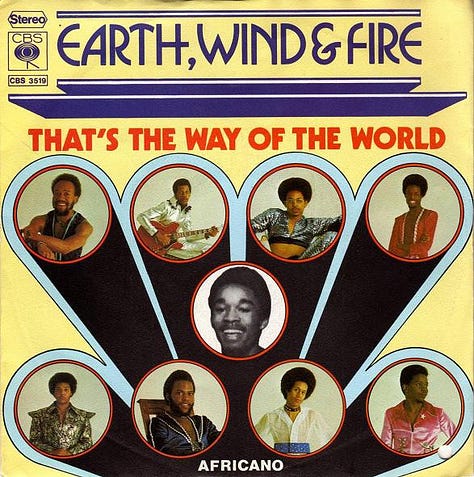
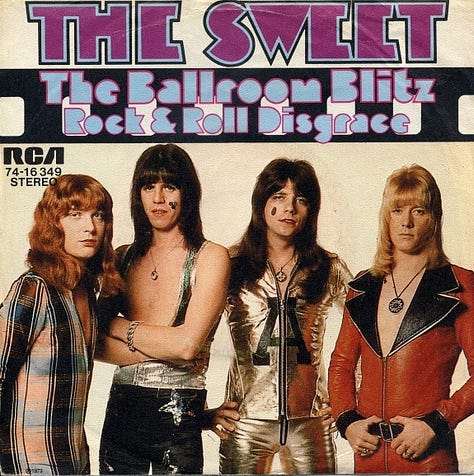
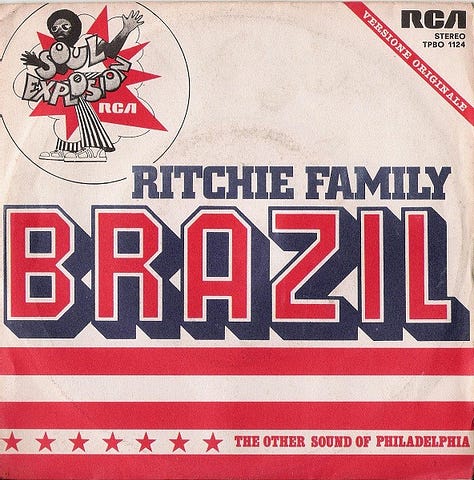
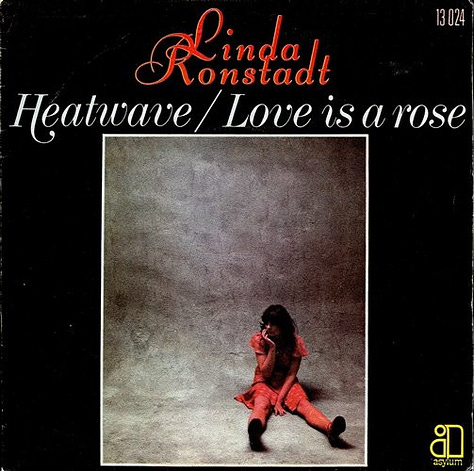
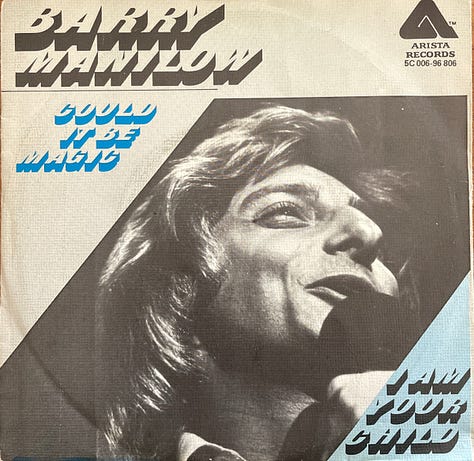
The accompanying playlist is at the bottom of the post, as always; songs not on streaming are embedded within. Part of this I wrote several years ago, and part of it’s new, but I’ve edited the original text — in some cases, heavily.
[this week, last week, title, artist, weeks on chart, peak-to-date]
1 2 FAME –•– David Bowie (RCA)-15 (2 weeks at #1) (1) — One of Bowie’s most famous singles is thanks to a single day popping into the studio in NYC with his then-new buddy John Lennon — who’s credited not only with the falsetto returns on the chorus but guitar and, maybe most importantly, tape loops. The opening of the song is Lennon’s! The genius guitar line is Carlos Alomar’s. The overall genius is, of course, Bowie’s. This killer one-off was the outlier on the Young Americans album, which was largely Bowie’s NYC R&B album (with a very young Luther Vandross all over the backgrounds) — and talk about a one-off: “Fame” was also Bowie’s first US and Canadian #1. In the rest of the world, it was generally a top 10 or top 20 hit, but nothing to write home about (#17 UK!), but here it was an unqualified smash. Also note that it was returning to #1, a week after having been deposed by John Denver (below), and that didn’t happen often at all in the US charts at the time. So big it ended up as the #7 single of 1975.
2 1 I’M SORRY / CALYPSO –•– John Denver (RCA)-8 (1) — This double A-side topped the pop, country, and AC charts. It was Denver’s third and final country #1 (he’d make that genre top 10 two more times — surprisingly, not again until 1981, and then again in ’85), his fourth and final pop #1 (he’d never trouble the pop top 10 again, but would chart top 40 infrequently through 1982), and the fifth of a whopping nine AC chart-toppers. Those stats alone should tell you both how cross-format and how ubiquitous Denver was, particularly in the first half of the ’70s. (Fun fact: “I’m Sorry” topped the country chart a full six weeks after it made the AC and pop summits, and in a beautiful example of the diversity of the country format at the time, it was preceded at #1 by Don Williams’ “(Turn Out the Light and) Love Me Tonight,” and followed by Waylon Jennings’ classic “Are You Sure Hank Done It This Way.”) “I’m Sorry” hews pretty closely to Denver’s blueprint of the era, with his voice and acoustic guitar accented by a string section, and while the Jacques Costeau ode “Calypso” largely does too, its production — both were done by legendary music man Milt Okun — is much more full and lush. Apart from the Carpenters, John Denver was my Mom’s favorite artist when I was a kid, so I know both of these quite well; my scale tips toward’s “Calypso”‘s production, but “I’m Sorry” is a much better song.
3 3 RHINESTONE COWBOY –•– Glen Campbell (Capitol)-19 (1) — This country-pop star has always come off as a bit too white bread for my tastes. “Wichita Lineman” is sad and pretty, but this is just makes me think of NFL halftime shows. Icky aspirational pop.
4 5 RUN JOEY RUN –•– David Geddes (Big Tree)-10 (4) — The ’70s really did love their story songs, didn’t they? And somehow, every goddamn one of them was sung poorly and featured bad musical accompaniment. This one is particularly egregious: Joey’s girlfriend Julie has a father who’s clearly mad that she’s been having sex with Joey. So he goes out with a gun (!) in search of Joey, and just as he’s about to shoot Joey, Julie steps in his line of fire. I mean, WTF?!
5 14 MR. JAWS –•– Dickie Goodman (Cash)-5 (5) — Dickie Goodman was arguably the king of novelty records, charting seven top 40 singles (under a variety of names) with a technique he pioneered, the “break-in” record. Wikipedia calls it “an early precursor to sampling, that used brief clips of popular records and songs to “answer” comedic questions posed by voice actors on … novelty records.” With this leap into the top 10, Goodman set a chart record he’d hold for 14 years, as his last appearance in the top 10 had been with 1956’s “The Flying Saucer” — a gap of 18 years between top 10s! (The record was broken by Roy Orbison in 1989 with “You Got It.”) Goodman’s catalog is actually a fascinating series of snapshots of pop music in various years, as most of his records use snippets of that year’s popular hits; featured in “Mr. Jaws,” for example, are Olivia Newton-John, the Eagles, “Rhinestone Cowboy.” I recommend a spin through his oeuvre, just from a pop-sociological POV.
6 25 BAD BLOOD –•– Neil Sedaka (Rocket)-4 (6) — You wanna talk comebacks? Before Tina Turner did it almost a decade later, one could make the argument that the biggest pop chart comeback of the modern era belonged to Neil Sedaka. From 1958-63, this teen idol with the gorgeous voice notched up 14 top 40 hits, including the 1962 #1 “Breaking Up Is Hard To Do.” And then he didn’t hit the top 40 again for 11 years, before returning with the biggest possible bang: another #1. He signed with Elton John’s Rocket label in 1974, and his first release was that year’s “Laughter in the Rain,” a pop and AC #1, and Sedaka followed it with a pair of top 30 hits. Then in ’75 came this smash, on its way to spending three weeks on top, thanks in at least small part to uncredited vocals from his label boss, Mr. John himself. Sedaka co-wrote and produced “Bad Blood” himself, so I give all the credit for its white boy funkiness to him; this is a tight record. (Though he also loses some credit for that flute.) “Bad Blood” went gold and by both sales and chart performance is the biggest single of Sedaka’s career; he’d continue charting here and there (especially at AC) through 1983.
7 9 BALLROOM BLITZ –•– Sweet (Capitol)-17 (7) — Sweet had an incredible run of six consecutive top 5 singles in the UK from 1972-74, none of them on an album. They were, at their prime, the epitome of a classic singles band, capable of making the catchiest, chewiest glam pop-rock. And since pop music is at its heart a single medium, they were one of the best, because their singles run(s) could compete with just about anybody’s. They were also the only major UK glam act to break through with any sustained success in the US, notching a quartet of top 10 records from 1972-78, including this one. Originally a #2 UK smash in 1973 (one of three #2s in a row, along with “Hell Raiser” and “Teenage Rampage”), it was released two years later in the US and made it to #5 here. “Blitz” is utterly unhinged, completely deranged, and absolutely perfect: glam at its finest.
8 12 DANCE WITH ME –•– Orleans (Asylum)-12 (8) — No, this isn’t from Waking and Dreaming, their album with the most amazing cover; that would come the next year and feature the hit “Still the One.” This is from its predecessor and is much more quasi-folky, definitely a product of the early ’70s, based around acoustic guitars and vocal harmonies, like a perkier Bread. Respond accordingly.
9 11 AIN’T NO WAY TO TREAT A LADY –•– Helen Reddy (Capitol)-9 (9) — From 1972-76, Reddy had a run of 12 consecutive top 5 AC hits, all but one of which hit either #1 or #2; this was the 7th of her 8 #1s on said chart. All of those 12 also made the top 40 on the pop chart, with a full half of those going top 10. “Ain’t No Way” was the last of those, making it one notch higher than it is here. As with most of her catalog, it’s commercially-inclined pop that spotlights her made-for-TV voice, with faux-feminist lyrics. The better “Ain’t No Way to Treat a Lady,” by the way, is by Bonnie Raitt (and co-written by Bryan Adams!).
10 24 ROCKY –•– Austin Roberts (Private Stock)-12 (10) — Not that Rocky, but yet another insipid story song, wherein “Rocky” is the narrator’s name. This features the jaw-dropping lyric “Rocky, I’ve never had to die before/I don’t know if I can do it.” Roberts went on to a successful career as a songwriter, earning an Oscar nod for a song from 1983’s Tender Mercies, as well as a pair of Grammys for songs by Lee Greenwood and Take 6. Really!
11 8 WASTED DAYS AND WASTED NIGHTS –•– Freddy Fender (ABC / Dot)-16 (8) — Ostensibly country-ish, but really just slushy pop by a Tex-Mex guy who should’ve known better.
12 16 FEELINGS –•– Morris Albert (RCA)-16 (12) — The careers of thousands of lounge singers were built on the back of this one-hit wonder. The fact that he’s Brazilian doesn’t make this song a whit more interesting.
13 17 IT ONLY TAKES A MINUTE –•– Tavares (Capitol)-11 (13) — Amazingly, the first of two songs in this top 20 covered (ably!) in the early ’90s by British boyband Take That (#16 below). Criminally, this was Tavares’ only US top 10 pop record; it was the second of their three R&B #1s. I love the full-bodied disco-soul arrangement, and their kick-ass vocal harmonies. And I will most certainly take this over…
14 18 THEY JUST CAN’T STOP IT THE (Games People Play) –•– The Spinners (Atlantic)-9 (14) — I have never, ever liked Bobby Smith’s lead vocals on this. Nor Thom Bell’s overly string-heavy production. Nor Evette Benton’s additional vocals. Nor the simplistic song itself. Everything about this record, down to the title’s punctuation (which makes me shudder), irritates me. With a few exceptions, the Spinners have always seemed to me one of the most overrated ’70s R&B groups.
15 15 I BELIEVE THERE’S NOTHING STRONGER THAN OUR LOVE –•– Paul Anka with Odia Coates (United Artists)-11 (15) — Bland but inoffensive pop with the slightest bounce.
16 6 COULD IT BE MAGIC –•– Barry Manilow (Arista)-15 (6) — If you’ve any doubts about Manilow’s prowess as a songwriter, just listen to this: the lyrics aren’t his, but the music is, based around Chopin’s Prelude in C Minor, Opus 28, Number 20 — I mean, c’mon, the guy’s a piano player, so that isn’t surprising. This is what a grand ballad should sound like, anchored by Manilow’s piano and strong vocals. After his 1974 single “Mandy” hit the top (and “It’s a Miracle” followed it into the top 15), Arista re-released his debut 1973 debut album, as Barry Manilow I. He re-recorded “Magic” for it, and was rewarded with another top 10 (reaching its peak this week). And the song wasn’t done: Donna Summer’s splendid uptempo disco version, recorded for her album A Love Trilogy, wasn’t a pop hit but made it to #21 R&B and #3 on the disco chart in early ’76. 18 years later, Take That — with a certain Robbie Williams on leads — based their Eurodance take on Summer’s uptempo version and hit #3 in the UK. And just to square the circle, in 2013, at the BBC’s Children in Need concert, Barry sang the first verse at its original ballad tempo, and then brought out Take That’s Williams and Gary Barlow to join him, finishing the song uptempo. I highly recommend you watch it: it’s showbiz at its finest.
17 30 WHO LOVES YOU –•– The Four Seasons (Warner Brothers / Curb)-7 (17) — Much like Neil Sedaka’s comeback (#6), wow: the Four Seasons hadn’t tasted top 10 glory since mid-1967, until lead singer Frankie Valli primed the pump in early ’75 with the top 10s “My Eyes Adored You” (#1) and “Swearin’ to God” (#6) — and figured out disco in the process. This rocketed to #3 in short order and spent 20 weeks on the Hot 100, longer than any of their previous hits. And, of course, this set them up nicely for their next single, the #1 “December, 1963.” Which is gross. This is at least serviceably slick, albeit very white, disco-pop.
18 40 LYIN’ EYES –•– Eagles (Asylum)-4 (18) — You want gross? Try this Glenn Frey-sung slab of country-rock misogyny! Appallingly, this would hit #2, win a Grammy, and even make the country top 10. Musically it’s fine, but those lyrics: UGH.
19 23 BRAZIL –•– The Ritchie Family (20th Century)-10 (19) — The perfect way to wash those Eagles out of your head is with a trip to “Brazil” courtesy of Jacques Morali’s Ritchie Family. This cover of a 1939 samba-exaltação composition by Ary Barroso, popularized in the 1942 Disney film Saludos Amigos, spent five weeks atop the Dance/Disco charts and made it to #11 pop. It’s got the classic disco high-hat running through it, and is a ridiculous, gorgeous disco fantasia.
20 21 HOW LONG (Betcha’ Got a Chick On the Side) –•– The Pointer Sisters (Blue Thumb)-12 (20) — At its pop peak, this third top 20 pop single for the Pointers was also their first and only R&B #1. It’s also — surprisingly, if you only know them for their late-’70s yacht-soul and ’80s pop-R&B output — funky as fuck.
21 7 AT SEVENTEEN –•– Janis Ian (Columbia)-17 (3) — A heartbreaking folk song given bigger production, which likely contributed to its becoming a hit on the scale it was. Ian’s lyrics are *chef’s kiss* at conveying the pain of adolescence.
22 27 MIRACLES –•– Jefferson Starship (Grunt)-7 (22) — The opposite of a miracle.
23 26 GONE AT LAST –•– Paul Simon and Phoebe Snow (Columbia)-8 (23) — Paul Simon is not meant to sing faux-gospel, not even with Phoebe Snow and the Jessy Dixon Singers backing him up. Not. Ever.
24 4 FIGHT THE POWER (Part 1) –•– The Isley Brothers (T-Neck)-16 (4) — Some of the hardest-funking stuff the Isleys would ever do; their mid-late ‘70s run is impeccable. From their first #1 pop album, the excellent The Heat Is On.
25 10 FEEL LIKE MAKIN’ LOVE –•– Bad Company (Swan Song)-14 (10) — That chorus sure is sticky, but boy is this uninspired chugga-chugga born-from-blues rock.
26 29 LADY BLUE –•– Leon Russell (Shelter)-10 (26) — A lovely record from the ever-genre-slippery Russell. The song is pretty as hell, and he gives it a rich, tender vocal.
27 13 THAT’S THE WAY OF THE WORLD –•– Earth, Wind and Fire (Columbia)-14 (12) — Note-perfect smooth soul, sweetened by the EWF horns and those layered vocal harmonies. This is the feel of that first blast of air conditioning on a blisteringly hot day.
28 31 CAROLINA IN THE PINES –•– Michael Murphey (Epic)-8 (28) — How in the world did this well-picked progressive country record not even make the country chart?! Murphey’s “Wildfire” follow-up is loads better, a country/bluegrass dream that made the top 30 solely, I’d guess, on the fumes of its predecessor. So so great.
29 33 DO IT ANY WAY YOU WANNA –•– The People’s Choice (TSOP)-7 (29) — A brilliantly funky Philly disco classic, on its way to #11 (and #1 R&B), that sounds just as good today as in the ‘70s.
30 19 FALLIN’ IN LOVE –•– Hamilton, Joe Frank and Reynolds (Playboy)-16 (1) — My immediate gut reaction is to say “Oh, this is Adult Contemporary cheese,” but when I actively listen to it for the first time in — maybe ever? — I’m struck by how pretty this is, the sheer loveliness of the arrangement. This legitimately works. Sure, the prevailing pop winds of the time helped it get to #1, but honestly, this probably deserved it.
31 44 HEAT WAVE / LOVE IS A ROSE –•– Linda Ronstadt (Asylum)-5 (31) — Now, this is value: the Holland-Dozier-Holland-penned A-side hit #5 pop, while the Neil Young-penned B-side hit #5 country. (Parent LP Prisoner in Disguise actually peaked higher on the country chart (#2) than on the pop chart (#4).) And guess what? Both are great. She rocks up the Martha and the Vandellas song, and strips down Young’s to its fiddle-and-banjo essence. Through most of the ‘70s, Ronstadt hardly missed.
32 32 MAIN TITLE (Theme From “Jaws”) –•– John Williams (MCA)-9 (32) — This should tell you just how big Jaws was in ‘75. But what I don’t get is, who actively wants to hear this, let alone buys it?
33 80 THE WAY I WANT TO TOUCH YOU –•– The Captain and Tennille (A&M)-2 (33) — Diss them at your peril, because Toni Tennille, with her clarion-clear voice, could actually pull off sexy. The follow-up to their career-opening #1, “Love Will Keep Us Together” — which is definitely not sexy — does everything right that its predecessor does wrong. This made it to #4 pop and was the second of five consecutive AC #1s, and I think it works on every level — but not as profoundly as Record World’s review of its original 1973 indie pressing: “A sensational 'ladies record' that should immediately garner tremendous pop and MOR airplay with super vocals, romantically explicit lyrics and a genuine hit sound.” Uh, wow.
34 34 YOU’RE ALL I NEED TO GET BY –•– Tony Orlando and Dawn (Elektra)-6 (34) — If you’re looking for a dumpster fire of a Motown cover, you came to the right place.
35 35 WHAT A DIFF’RENCE A DAY MAKES –•– Esther Phillips (Kudu)-8 (35) — Phillips applied her Dinah Washington-esque voice to an urgent disco cover, and it kinda works in spite of itself.
36 38 I ONLY HAVE EYES FOR YOU –•– Art Garfunkel (Columbia)-7 (36) — The problem with this cover is that it doesn’t do anything but just sit there.
37 37 I GOT STONED AND I MISSED IT –•– Jim Stafford (MGM)-8 (37) — Stafford, he of" “Spiders and Snakes” fame, is the dictionary definition of a hack.
38 42 ROCKIN’ ALL OVER THE WORLD –•– John Fogerty (Asylum)-5 (38) — I’m typically allergic to Fogerty in any form, but this tight little rocker with guitar that I’d compare to Brad Paisley (seriously, do you know what a hot guitarist that guy is?) works on me.
39 39 IF I EVER LOSE THIS HEAVEN –•– The Average White Band (AWB) (Atlantic)-7 (39) — The funkiest Scots around turned a Leon Ware co-write from Quincy Jones’s 1974 smash Body Heat into a smart shuffle for their sophomore LP. They change it up just enough to freshen it — not that Q’s original needed freshening, but they pull it off nonetheless.
40 43 THIS WILL BE –•– Natalie Cole (Capitol)-6 (40) — This is what it sounds like to record sheer ebullience. Cole’s debut single is well-written and -produced, but it’s really about her joyous vocal. A deserved top 10 pop/#1 R&B record.



I had completely forgotten about Bonnie Raitt's "No Way To Treat A Lady" - so good! And I remember listening to my mom's 8-track of Helen Reddy's Greatest Hits as a kid. I knew those songs inside and out which is slightly disturbing for 7 year old me haha.
I love these posts because they help me find songs I have never heard before - case in point that Pointer Sisters song. So funky and so different from the stuff they are known for.